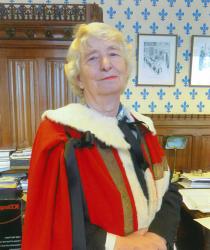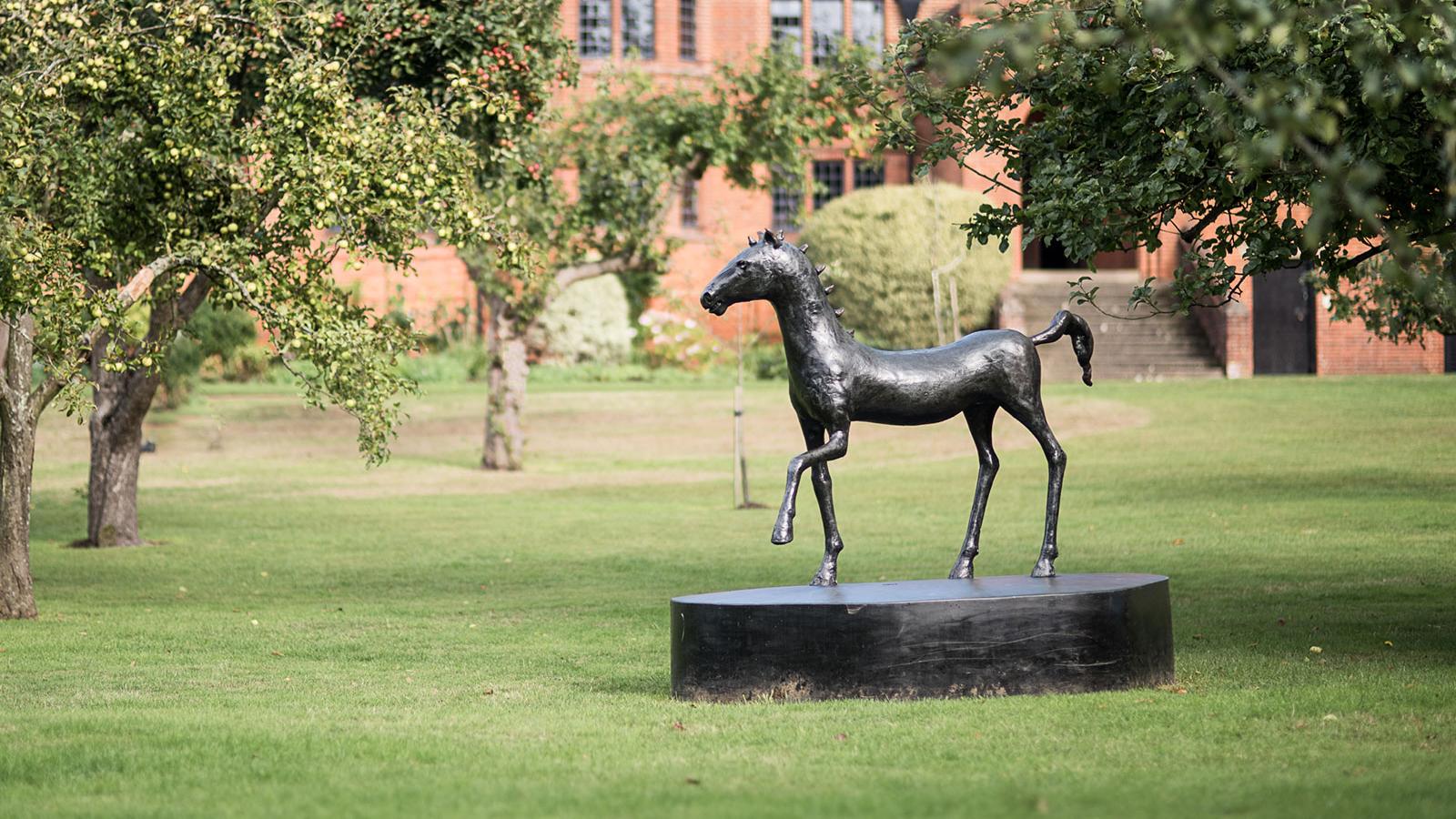
Cressida Dick’s 2017 appointment as the first female and first openly gay Commissioner of the Metropolitan Police was the final brick in a wall that had initially been constructed by a select number of people over a number of years. Foremost among them was Jenny Hilton, more properly Baroness Hilton of Eggardon, who spent 34 years as an officer in the Metroplitan Police, beginning in the days when women comprised barely 1% of the service. Jenny talks to us about professional life, being a working peer and her enduring relationship with Bedales, where she spent six years as a student and another eight as a Governor.
Schooling for the war-time generation of children was inevitably an uncertain pursuit and it could be a somewhat haphazard one at times. Such was the case for Jenny Hilton, although her varied upbringing and education was never less than fascinating. A ‘Foreign Office kid’, in her own words, Jenny spent a good deal of her childhood abroad, surrounded by culture-loving relatives and attending a number of different schools. “Seven others before I went to Bedales,” she claims.
When the time came for something a little more permanent, Jenny’s sole desire was that she should be sent to a mixed school. “Having lived abroad for much of my life, I was already relatively grown up and I’d also read all the Edwardian stories about boarding school so that didn’t worry me at all,” she says. “My mother’s only stipulation to me was that I must be definite in my final choice – ‘I don’t mind’ wouldn’t be satisfactory.”
Bedales, when Jenny arrived there, provided the stable and friendly environment that every child needs. “John Badley’s original concept was very much in evidence to me,” she observes. “Each child was clearly as valued as the next one, and not solely on academic grounds, although the school was never as structured in my day as it later became when society started to demanded that rather more attention be paid to exam results. In retrospect, I must say that I wasn’t pushed hard enough – I needed help in learning precisely how to study effectively and nobody particularly took me under their wing in that respect, although I liked the majority of my teachers well enough. I played some mah-jong at social evenings with Anthony Gillingham’s family but learned less of what might have been useful for passing my A Levels. All that might explain why I became such a compulsive auto-didact in later life.”
John Badley's original concept was very much in evidence to me. Each child was clearly as valued as the next one, and not solely on academic grounds
Although not particularly gifted in the games arena, Jenny tried her hand at most things that Bedales offered. “I never could sing in tune and my experience of the great outdoors was rather confined to the more mundane tasks such as sawing up logs but it was in the art room that I thrived most,” she says. “My uncle Roger (Hilton) was a noted abstract artist and my mother painted with him when they were studying in Paris. Betty Tweed and later Christopher Cash were my art teachers at Bedales and I took an art ‘O’ level. During the holidays, I used to count the days before I could return to school. Family life had become rather more complicated in the post-war days and my parents felt more constricted than they had during the 1930s.”
Already fearful about the idea of life after Bedales, Jenny’s worries about her future deepened after taking an unsuccessful series of A Levels. “I had vaguely imagined that I might go on to university but even though that was now a non-starter, I had no intention of going into professions available to women such as nursing or social work, towards which some of my family appeared to be nudging me,” Jenny reflects. “Finding a job without official qualifications wasn’t easy and I did various psychology tests to see what might suit my character. I wasn’t lazy but coming from a family of polymaths, I suspect that I was fearful of being regarded as dim. I wanted to be able to work hard to achieve while giving the impression of doing so with apparent ease!”
Jenny quickly recognised that what she did need was a framework that would demand discipline: “The first thing I did was to spend six months at the Sorbonne in Paris getting myself a diploma; for the first time I found that I enjoyed applying myself academically. I then swanned off to Istanbul, where I remained for another three months or so before coming back to Britain and joining the Metropolitan Police. I wasn’t to know it then but it would be a haven for me for the next 34 years, comparable with Bedales in my younger days in that sense.”
A haven it may have been but the Met that Jenny joined in the late 1950s offered an environment that was more noted for its rigour than its diversity or inclusiveness. “There were 300 women in the Met when I joined, as opposed to the many thousands when I retired,” she says. “The police were also famously anti-homosexual and conducted vendettas against gay people for many years, which was scarcely designed to make me, a gay woman, especially comfortable.”
Female police were in fact treated almost as an arm of the social services at the dawn of Jenny’s career with the Met. “There weren’t the children’s officers of today who could deal with troubled kids in the wider world,” Jenny explains. “Only police and the NSPCC had the power to remove neglected children from their families and that was almost the specialist role for female officers. My first posting was to Stepney, which was a tough introduction, full of prostitutes controlled by Maltese gangs, but strange though this might seem to people today, we were much more embedded within the community back then. The police were relied on by those they served to a far greater degree.”
History tells us that with the liberalisation of society in the 1960s came accompanying changes to the way in which Britain was policed. “My sense is that individual police officers generally became more compassionate and that the job became cleaner, although never antiseptic,” Jenny muses. “Not every member of the force liked the changes, of course, and there were still pockets of bad behaviour within it that besmirched the rest of us at times. Technology had a huge impact in bringing the force up to date; at the same time, though, we lost some of that old contact with our public that we had known in my earlier years.”
Jenny herself swiftly established a reputation beyond many of her peers; a series of promotions would follow and along with them the inevitable resentment of some of her male colleagues. “It wasn’t a problem when I was rising through the exclusively female ranks,” she says. “Rivalry started to rear its ugly head only when I started to be given command over male officers. One heard the snide remarks but one simply ignored them and got on with the job. At no stage did I feel that I was smashing a glass ceiling; it was much more a series of slow progressions that took me where I eventually went.”
You must have clarity if you wish to lead people. That’s about it. Too many modern leadership courses make the mistake of emphasising dozens of different qualities when only one or two really matter
Her odyssey through the Met is chronicled in Jenny’s autobiography Copper Lady, which was published last year. By the time she called time on her career she had reached the rank of Commander and was one of the two most senior female officers in the Met. “Leaders, in my opinion, have to be straightforward, both in their principles and in explaining how they want them applied,” Jenny believes. “You must have clarity if you wish to lead people. That’s about it. Too many modern leadership courses make the mistake of emphasising dozens of different qualities when only one or two really matter.”
At her retirement, Jenny was still maintaining a close relationship with her alma mater, serving for eight years as a Bedales Governor. “One of my fellow Governors was Tess Rothschild and it was she who sounded me out about becoming a member of the House of Lords,” Jenny explains. “Tess wondered if I needed a job that paid, or whether my police pension might be sufficient for the House of Lords, which was of course unsalaried and then only paid £30 for a day’s attendance. I assured her that I did not need paid employment. Margaret Thatcher hadn’t much believed in creating Opposition peers but she had gone and John Major was offering half a dozen spots in the House of Lords to the Opposition in 1991. I was invited to meet Neil Kinnock, who was keen to establish better relations between the Labour Party and the police, and I started as a peer without a clue about what I was getting myself into.”
As Baroness Hilton of Eggardon, Jenny was quickly into her stride. “I had to learn everything from scratch but I like new challenges,” she says. “It was a little odd initially for a police person with an in-built aversion to getting involved with politics but it was good to put my experience to some practical use. I was soon swept into helping to oppose that awful Police Bill of the time – we managed to get some good and effective changes made there – and later I was invited by Lord Denton to look into the quality and delivery of forensic science laboratories. I’ve spent a lot of my time as a peer on various committees, dealing with eminent and clever people a world away from some of the early police committee meetings that I used to attend! It suits me – I’m decisive but I also like to be collaborative.”
I contribute to the John Badley Foundation because I think that Bedales is a place that is an example of what education can achieve with the right ideas behind it
Still actively involved in House of Lords business, Jenny intends to call it a day imminently. “When you reach my age, a lot of your friends are no longer around,” she comments. “By this winter, I think, I shall have done enough – I really don’t fancy the commute up to Westminster for much longer than that. There are a few self-indulgent things, as opposed to grand ambitions, that I would like to give more attention to; screen-printing, art, gardening, my fishponds and I would like to start playing chess again. I still read as widely possible and self-education has remained a lifelong process.”
The scene of her formal education retains a place in Jenny’s thoughts, however. “I still think fondly of Bedales,” she confirms. “I see one or two old friends and I contribute to the John Badley Foundation because I think that Bedales is a place that is an example of what education can achieve with the right ideas behind it. The ethos at Bedales always was the right one, it is unchanged and that’s what makes it so important to preserve it for future generations.”
Jenny Hilton was interviewed by James Fairweather in Summer 2021.
